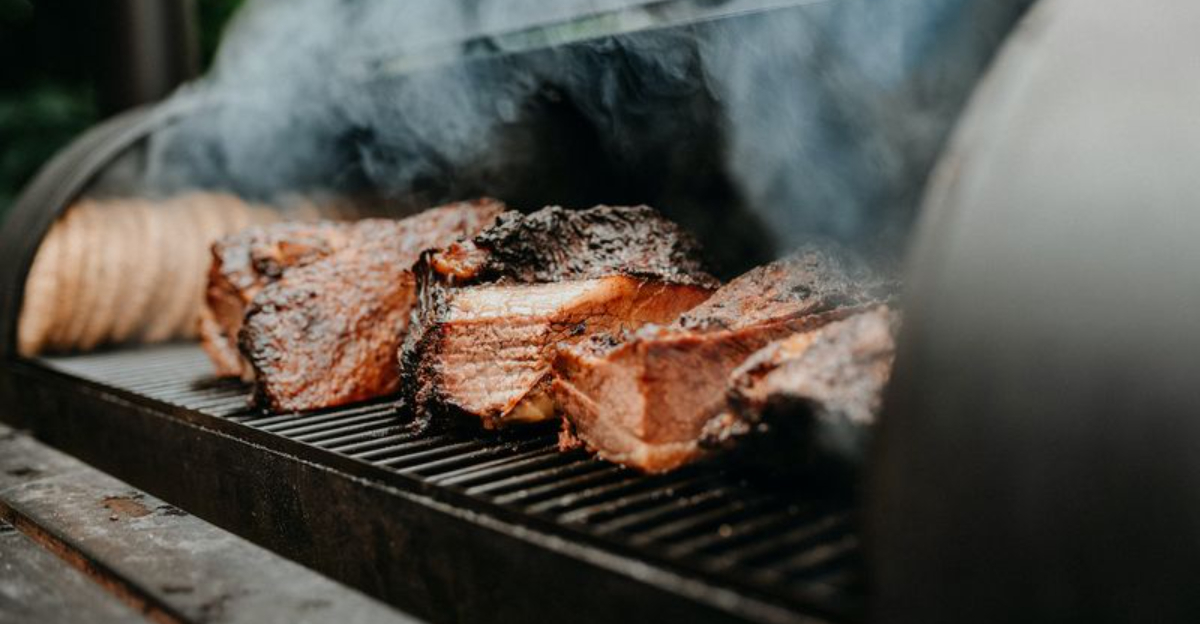Georgia And South Carolina: 12 BBQ Rules That Spark Debate Among Locals

In the South, barbecue is more than food. It’s a way of life filled with passion, pride, and plenty of friendly rivalry.
Georgia and South Carolina each claim their own BBQ traditions, sparking lively debates over sauces, smoking styles, and sides.
These 12 BBQ rules stir up the kind of spirited conversations that keep pitmasters on their toes and fans fiercely loyal.
Get ready to dive into the smoky, saucy world of Southern BBQ battles.
1. Sauce vs. No Sauce: The Fundamental BBQ Divide
Some purists consider sauce a cardinal sin—a cover-up for inferior smoking skills. “If your meat needs sauce, you didn’t cook it right,” argues fifth-generation Georgia pitmaster Earl Jenkins.
On the flip side, South Carolina sauce devotees claim their ancestors perfected barbecue sauces for good reason.
The sauce-loving crowd believes proper BBQ should swim in flavor that soaks into every fiber of the meat.
Family reunions across both states have literally split tables over this debate, with sauce bottles sometimes smuggled in like contraband at certain BBQ joints.
2. Mustard-Based vs. Vinegar-Based: The Great Sauce Standoff
Yellow gold flows through South Carolina’s BBQ veins. Their mustard-based sauce—tangy, sweet, and distinctively yellow—marks their BBQ territory as clearly as a state line.
Cross into certain parts of Georgia, and vinegar-pepper sauce reigns supreme. “That mustard stuff is for hot dogs,” jokes Georgia BBQ champion Mabel Wilson, whose vinegar sauce recipe dates back to 1887.
The rivalry runs so deep that some restaurants near the state border offer both options—but watch carefully which one the locals reach for first.
3. Pulled Pork vs. Chopped: The Texture Throwdown
“You can tell a Georgia man by how he likes his pork,” chuckles pitmaster Bobby Lee, yanking apart a steaming hunk of shoulder into long, succulent strands. Pulled pork enthusiasts swear by the satisfying tug and distinct texture.
Drive twenty miles across the Savannah River, and you’ll find South Carolinians wielding cleavers with surgical precision. Chopped pork advocates argue their method distributes fat and flavor more evenly.
At bi-state BBQ competitions, judges have been known to disqualify entries solely based on the cutting technique—talk about high steaks (or should we say stakes)!
4. Whole Hog vs. Shoulder Only: The Cut Controversy
“My daddy would roll in his grave if I didn’t cook the whole pig,” declares South Carolina pit legend Martha Simmons. Traditional whole hog enthusiasts believe the varied cuts create a perfect blend of flavors and textures that shoulder-only can’t match.
Georgia’s shoulder-only faction counters with practicality. “Why waste time on parts that don’t eat as good?” asks Atlanta pitmaster James Brown, not the singer but equally passionate about his craft.
The annual Border Battle BBQ Fest features separate categories for each approach, with state pride on the line and no shortage of trash talk between competitors.
5. Dry Rub vs. Wet Marinade: The Seasoning Skirmish
Rub devotees treat their spice blends like family heirlooms, often containing upwards of twenty ingredients. “My great-grandmother would mix her rub by moonlight so nobody could steal the recipe,” boasts Georgia champion Rick Davis.
Across the border, wet marinade believers soak their meat overnight in vinegar-based concoctions. “The longer the soak, the deeper the flavor,” explains Charleston pitmaster Louisa Mae Jackson, who starts her marinade three days before cooking.
Friendly wagers between neighboring towns over which method reigns supreme have sometimes escalated to mayor-versus-mayor cook-offs with bragging rights lasting decades.
6. Wood Wars: Hickory vs. Oak vs. Pecan
Smoke signals tell different stories depending on which wood burns beneath the pit. Hickory hardliners claim its bold, bacon-like aroma is the only authentic BBQ smoke, particularly in upstate South Carolina.
Georgia’s oak brigade argues for subtlety. “Hickory’s for showing off—oak lets the meat talk,” explains third-generation Augusta pitmaster Samuel Johnson, who harvests his own oak.
Meanwhile, pecan wood has gained a devoted following along coastal regions. The sweet, nutty smoke has converted many traditionalists, though some old-timers dismiss it as “dessert smoke” not suited for serious BBQ.
7. Slaw on the Sandwich or on the Side: The Topping Tussle
Walk into a Georgia BBQ joint and order a pulled pork sandwich, and your slaw arrives in a separate container. “Slaw belongs on the plate, not the meat,” insists Savannah native and BBQ judge Timothy Green.
Cross the state line, and many South Carolina pitmasters pile creamy slaw directly atop the meat before closing the bun.
The combination creates what locals call “the perfect bite”—tangy meat, sweet slaw, and soft bread melding together.
Family feuds have erupted over this seemingly small detail, with some households setting up separate serving stations to maintain peace at reunions.
8. Tomato-Based Sauces: The Red Rebellion
Red sauce enthusiasts wave their tomato-based banners proudly across western Georgia.
“The sweet-tangy balance is what makes our BBQ better than anything across the border,” boasts Columbus pitmaster Frank Wilson, whose ketchup-based sauce has won regional awards.
South Carolina traditionalists scoff at this approach. “That’s not BBQ sauce—that’s glorified ketchup,” quips Charleston BBQ matriarch Eliza Charleston, whose family hasn’t allowed tomato-based sauce at their table since 1932.
Some border towns host annual “Red vs. Yellow” competitions where blind taste tests determine the year’s bragging rights between the rival sauces.
9. Gas vs. Wood Smoking: The Heat Source Hostility
“That ain’t BBQ—that’s outdoor baking!” hollers South Carolina pitmaster Vernon Lee at the mere mention of gas smokers.
Wood-smoking purists consider gas-assisted cooking nothing short of sacrilege, arguing that real smoke flavor comes only from burning actual wood.
Modern Georgia pitmasters counter with consistency arguments. “My customers don’t care if I used a match or a lighter—they care about perfect ribs every single time,” explains Atlanta restaurant owner Maria Jackson.
The debate has grown so heated that some competitions now have separate categories for each method, with traditional wood-smoking typically drawing the larger crowds.
10. Brunswick Stew: Side Dish or Main Event?
Georgia claims Brunswick stew as its BBQ companion—a thick, smoky vegetable and meat concoction that sometimes threatens to steal the spotlight.
“A proper Georgia BBQ plate needs stew front and center,” declares Brunswick native Harold Thompson.
South Carolinians typically relegate the dish to side status.
“Good stew complements the meat but never competes with it,” explains Charleston pitmaster Sarah Jenkins, who serves her stew in coffee cups rather than bowls.
Annual stew cook-offs have their own fierce rivalries, with some recipes guarded more closely than the BBQ techniques themselves—especially regarding the controversial addition of lima beans.
11. Bread Battles: White Slice vs. Cornbread
Slap a slice of white bread next to Georgia BBQ and nobody bats an eye. The soft, spongy texture soaks up sauce and provides the perfect edible napkin.
“If it ain’t Sunbeam, it ain’t a real BBQ plate,” quips Macon pitmaster Jefferson Davis. South Carolina cornbread defenders stand their ground with equal conviction.
“White bread is for school lunches—cornbread is for BBQ,” declares Charleston’s award-winning pitmaster Louella Jenkins.
The bread battle extends to sandwich construction too, with Georgia favoring soft buns while South Carolina pitmasters might serve meat between two cornbread slices—a move that would get you strange looks across the border.
12. The Foil Wrap Feud: To Wrap or Not To Wrap
“Cheating!” That’s what old-school South Carolina pitmasters yell when they catch someone wrapping meat in foil during smoking.
The traditionalists believe meat should face the smoke unprotected for the entire cook.
Georgia’s competition circuit has largely embraced the “Texas crutch”—wrapping meat in foil partway through smoking to speed cooking and retain moisture. “It’s about results, not rules,” argues Atlanta BBQ champion Robert Lee.
The divide is so stark that some pitmasters will literally turn their backs when others begin wrapping, refusing to witness what they consider a BBQ sin worse than using lighter fluid.
